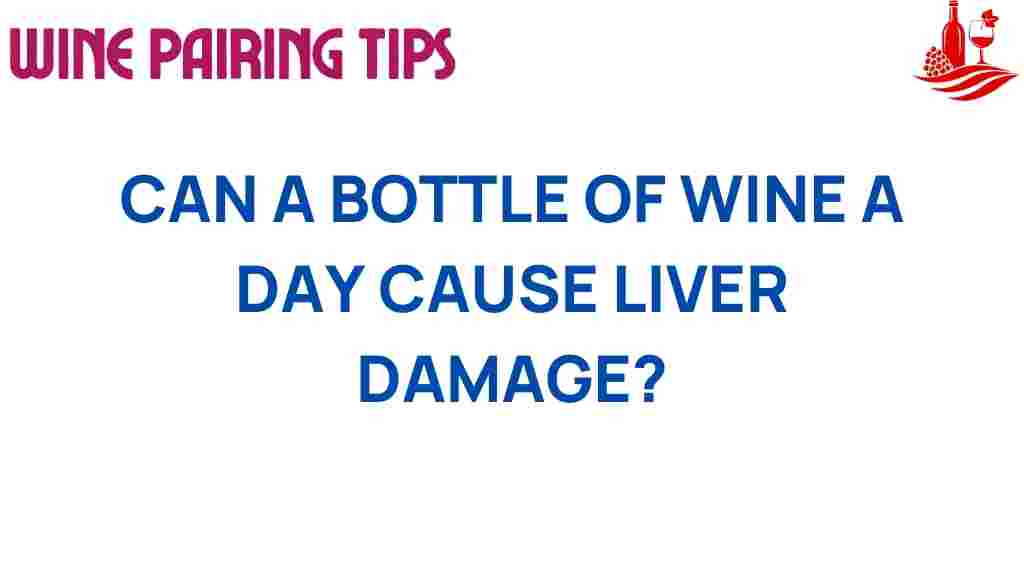Can Daily Wine Consumption Lead to Liver Damage?
Wine has been a staple in many cultures for centuries, often praised for its potential health benefits when consumed in moderation. However, the question remains: can daily wine consumption lead to liver damage? The surprising truth is multifaceted and involves understanding the health risks associated with alcohol effects on the body, particularly the liver. In this article, we will delve into the relationship between daily drinking and liver health, outlining the potential consequences and providing insights on safe consumption levels.
Understanding Wine Consumption and Its Effects
Wine consumption, particularly red wine, is often linked to various health benefits, including heart health and antioxidant properties. However, the positive effects can quickly turn negative when consumption exceeds recommended levels.
- Moderate Wine Consumption: Defined as one glass per day for women and up to two glasses for men.
- Heavy Drinking: Consuming more than the moderate levels regularly can lead to serious health issues, including liver damage.
The Science Behind Alcohol and Liver Health
The liver plays a crucial role in metabolizing alcohol. When you consume wine, the liver works to break down ethanol, the active ingredient in alcoholic beverages. However, excessive intake can overwhelm the liver’s capacity to process alcohol, leading to various forms of liver damage.
Health Risks Associated with Daily Drinking
Daily drinking can lead to several health risks, primarily affecting the liver. Here are the main types of liver damage associated with excessive wine consumption:
- Fatty Liver Disease: Accumulation of fat in liver cells, often reversible with abstinence.
- Alcoholic Hepatitis: Inflammation of the liver due to excessive alcohol intake, which can be severe.
- Cirrhosis: Scarring of the liver that occurs after prolonged liver damage, potentially leading to liver failure.
How Much Wine is Too Much?
To understand the potential for liver damage, it’s essential to know how much wine is considered safe. The general guidelines suggest:
- Women: Up to one 5-ounce glass of wine per day.
- Men: Up to two 5-ounce glasses of wine per day.
Exceeding these limits regularly increases the risk of liver damage and other health issues.
Signs of Liver Damage Due to Alcohol Consumption
Recognizing the signs of liver damage early can be critical in preventing further complications. Common symptoms include:
- Fatigue and weakness
- Loss of appetite and weight loss
- Nausea and vomiting
- Abdominal pain and swelling
- Jaundice (yellowing of the skin and eyes)
If you experience these symptoms and have a history of heavy wine consumption, it is crucial to consult a healthcare professional.
Step-by-Step Process: Reducing Your Wine Consumption
If you are concerned about the effects of daily wine consumption on your liver, consider the following steps to reduce your intake:
- Set Clear Goals: Determine how much you currently drink and set a realistic goal for reduction.
- Keep a Journal: Track your drinking habits to identify patterns and triggers.
- Limit Availability: Keep less wine at home to reduce the temptation to drink.
- Incorporate Alcohol-Free Days: Designate certain days of the week as alcohol-free to give your liver a break.
- Seek Support: Join groups or seek professional help if you find it challenging to cut back.
Troubleshooting Tips: Overcoming Challenges
Reducing wine consumption can be challenging, especially if it has become a daily habit. Here are some troubleshooting tips to help you succeed:
- Find Alternatives: Replace wine with non-alcoholic beverages like sparkling water or herbal tea.
- Stay Busy: Engage in activities that keep your mind off drinking, like exercising or picking up a new hobby.
- Practice Mindfulness: Be aware of your cravings and use mindfulness techniques to manage them.
Conclusion: The Balance of Wine Consumption
In conclusion, while daily wine consumption can be enjoyed in moderation, it is essential to be aware of the potential health risks, especially concerning liver damage. Understanding the effects of alcohol on the liver and recognizing the signs of damage can help you make informed choices about your drinking habits.
To maintain liver health, it is crucial to adhere to recommended limits and consider alcohol-free days. If you’re looking for more information on how to stay healthy while enjoying wine, check out this informative guide on alcohol and lifestyle choices.
Remember, moderation is key, and if you have concerns about your wine consumption, don’t hesitate to consult with a healthcare professional for personalized advice.
For more insights on health risks associated with alcohol effects, visit this resource.
This article is in the category Tips and created by Wine Pairing Tips Team
